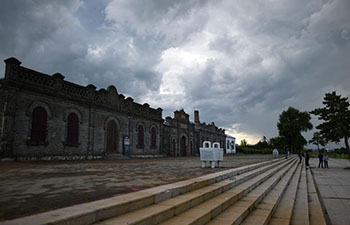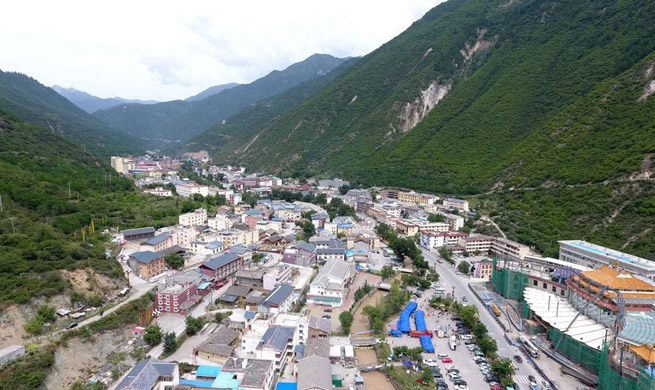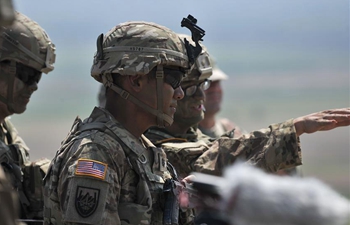BEIJING, Aug. 10 (Xinhua) -- Amid widespread concerns of the international community, the United States and the Democratic People's Republic of Korea (DPRK) have stepped up their exchange of tough words regarding Pyongyang's nuclear and missile programs.
In the latest of the increasingly intense war of words, Pyongyang said it would prepare a plan by mid-August to strike the U.S. territory of Guam with intermediate missiles, the Korean Central News Agency (KCNA) reported Thursday.
General Kim Rak Gyom, commander of the Strategic Force of the Korean People's Army (KPA), was quoted as saying in a statement that the country's Strategic Force is mulling an "enveloping strike" using four missiles targeting waters 30-40 km off the coast of Guam.
The KPA will act to strike Guam upon order of DPRK leader Kim Jong Un, also the country's top nuclear commander, the KCNA cited the military official as saying.
Pyongyang first announced the plan to strike Guam on Wednesday, saying the planned move is to "interdict the enemy forces on major military bases on Guam and to signal a crucial warning to the United States."
The announcement was believed to be in response to earlier remarks of U.S. President Donald Trump threatening "fire and fury like the world has never seen" against the DPRK.
Trump's remarks came as the world was digesting an official Japanese report and a classified U.S. intelligence document, as reported by the Washington Post, both of which suggest that the DPRK was closer to being able to strike the United States with a nuclear missile than previously thought. It is yet unknown if the Trump war rhetoric has anything to do with these reports.
On Wednesday, Trump underlined the powerfulness of the U.S. nuclear arsenal, and said "hopefully we will never have to use this power," which some analysts described as apparently less fiery than Tuesday's "fire and fury" remarks.
U.S. Secretary of State Rex Tillerson tried to play down escalating tensions between Pyongyang and Washington.
"Nothing that I have seen and nothing that I know of would indicate that the situation has dramatically changed in the last 24 hours," Tillerson told reporters on the way back to the United States from his Asia trip.
"I think Americans should sleep well at night, have no concerns about this particular rhetoric over the last few days," Tillerson added.
Defending Trump's comments, Tillerson said the U.S. president felt it necessary to issue a very strong statement directly to the DPRK.
"But I think what the president was just reaffirming is the United States has the capability to fully defend itself from any attack and defend our allies, and we will do so," Tillerson added.
But like in every similar situation, when the top U.S. diplomat tries to dispel fear over a possible war, the country's defense chief will dish out even tougher statements over the same matter.
"The DPRK must choose to stop isolating itself and stand down its pursuit of nuclear weapons," U.S. Secretary of Defense Jim Mattis said in a statement on Wednesday, urging Pyongyang to "cease any consideration of actions that will lead to the end of the regime and destruction of its people."
The U.S. defense chief also warned that the DPRK's actions "will continue to be grossly overmatched by ours and would lose any arms race or conflict it initiates."
Tillerson said earlier during his Asia trip that the United States does not seek a regime change in the DPRK, or an accelerated reunification of the peninsula, or using the issue as an excuse to send the U.S. military north of the 38th Parallel.
The ongoing exchange of threats between Washington and Pyongyang has further escalated tensions on the Korean Peninsula and harmed the prospect of a peaceful solution to the thorny issue, aggravated dramatically recently after the DPRK fired two intercontinental ballistic missiles.
UN Secretary-General Antonio Guterres was "deeply concerned" on Wednesday about tension on the Korean Peninsula and "troubled by the increase in confrontational rhetoric" between Pyongyang and Washington, his spokesman, Stephane Dujarric, told reporters at the UN Headquarters.
The spokesman also said Guterres underscored the importance the UN Security Council has "placed on working to reduce tensions in the Korean Peninsula and beyond."
"The secretary-general welcomes all initiatives that will help to de-escalate tensions and result in a return to diplomacy," Dujarric said.

















